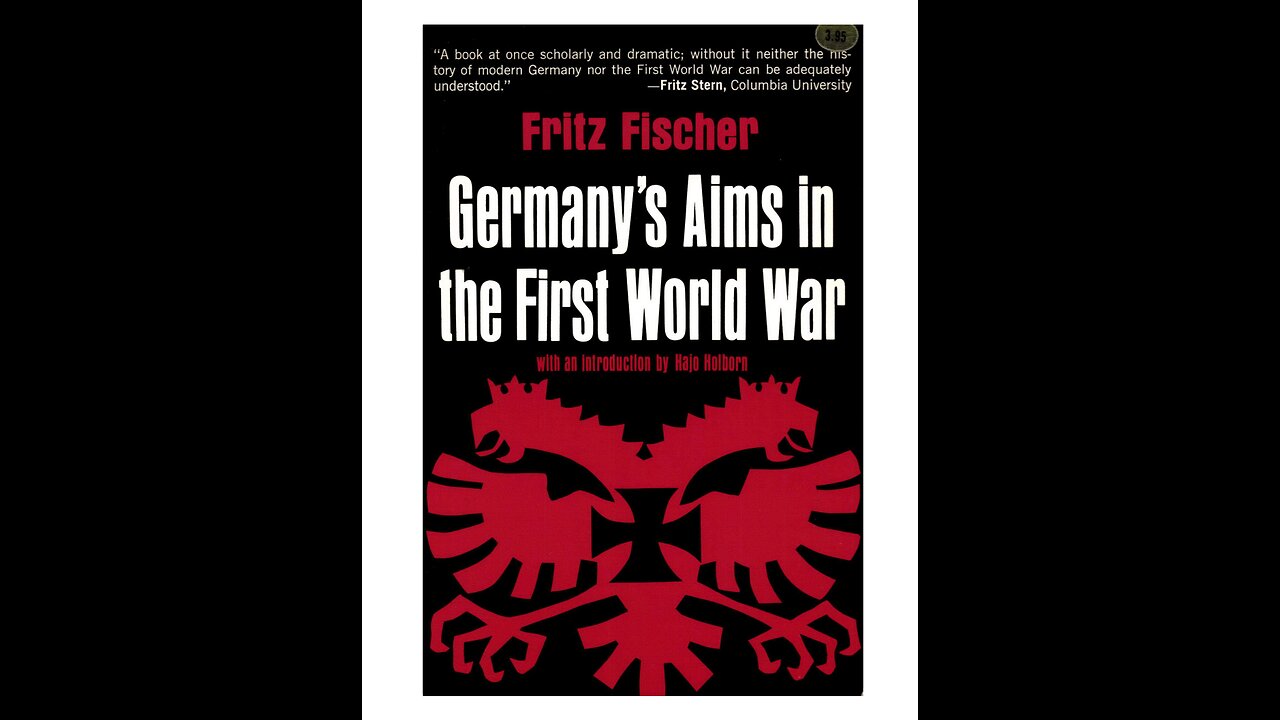Premium Only Content

GERMANY'S AIMS IN THE FIRST WORLD WAR. Fritz Fischer. Part 1
Part One
Chapters 1-11
GERMANY'S AIMS IN THE FIRST WORLD WAR.
Fritz Fischer.
Copyright 1961.
Translation Copyright 1967.
Reformatted for Text to Speech 2025.
General reformatting Rules.
Abbreviations are generally spelled out in full.
Dr. becomes Doctor, Mr. becomes Mister, mathematical or geographical symbols are spelled out in full.
Dates of Months are spelled out explicitly as May 17 becomes May the seventeenth, or the seventeenth of May.
Acronyms have spaces included, so OHL is written as O H L.
Years are generally split into two number groups with a space, thus 1917 becomes 19 17.
Years with a zero are spelled out phonetically, and as an example, 1905 becomes nineteen oh five.
Semicolons, dashes, en-dashes and em-dashes are replaced with commas.
Brackets are generally replaced with comas.
Quotation marks are generally removed, as these are often miss-spoken by TTS systems.
Most names and quotations are translated into English.
For example: Verein deutscher Eisenhuttenleute is written as Association of German Ironworkers.
FullTTS Text available at archive.org
https://archive.org/details/germanys-war-aiims-ww-1
GERMANY'S AIMS IN THE FIRST WORLD WAR.
Fritz Fischer.
Copyright 1961.
Translation Copyright 1967.
Reformatted for Text to Speech 2025.
General reformatting Rules.
Abbreviations are generally spelled out in full.
Dr. becomes Doctor, Mr. becomes Mister, mathematical or geographical symbols are spelled out in full.
Dates of Months are spelled out explicitly as May 17 becomes May the seventeenth, or the seventeenth of May.
Acronyms have spaces included, so OHL is written as O H L.
Years are generally split into two number groups with a space, thus 1917 becomes 19 17.
Years with a zero are spelled out phonetically, and as an example, 1905 becomes nineteen oh five.
Semicolons, dashes, en-dashes and em-dashes are replaced with commas.
Brackets are generally replaced with comas.
Quotation marks are generally removed, as these are often miss-spoken by TTS systems.
Most names and quotations are translated into English.
For example: Verein deutscher Eisenhuttenleute is written as Association of German Ironworkers.
Introduction TO THE AMERICAN EDITION.
Students of history as well as the general reading public in recent years have given greatly increased attention to the history of World war one, the war that ushered in the age in which we live. The war started over European conflicts and for the first three years was fought chiefly by European powers, although Russia was more than a European power and the British overseas dominions early came to the assistance of the mother country. Moreover, final victory or de-feat even in the years 19 14 to 16 would have decided the fate not only of Europe but of the Middle East and Africa as well.
By 19 17 the European powers found themselves incapable of breaking the military stalemate that had lasted since the fall of 19 14. Only the entry of the United States, which turned the war into a global war, made the full defeat of Germany possible. In the same year, 19 17, the Bolsheviks seized power in Russia and at the very moment when democracy seemed about to become the universal form of government the foundations of the first totalitarian state were laid. Ever since the struggle between democracy and totalitarianism has been the major conflict of our time.
Another significant aspect of World War One was the transformation of war itself. Whereas the European wars of the nineteenth century had been fought only by armies, all the human and material re-sources of the belligerent nations were mobilized in the long war of 19 14 to 18.
It became what Ludendorff first called a total war. Owing to the blockade and the limitation of her reserves this process went farthest in Germany. The German economy ultimately was converted into a government-directed economy which could be characterized as either war socialism or state capitalism. At the same time Germany, which after the summer of 19 17 was under a virtual military dictatorship, went further than any other nation in the control of public opinion and individual expression. This wartime system of economic and ideological control was easily revived and ex-tended by National Socialism. Thus World War One created a model for the fascist version of totalitarianism as well.
With this book on German war aims policy in World War One Professor Fritz Fischer has made a significant contribution to the under-standing of the events of World War One which left a deep mark on the history of the subsequent thirty years. Through long labor he has collected from archives in West and East Germany and Austria a tremendous range of mostly unpublished material, which serves as the solid basis of his work. It does not seem likely that future students of the German war aims will be able to cull any important additional information from official records. New material may appear from private sources and some actually has come to light since the German edition of this book was published in 19 61, but it has only confirmed some of Fischer’s judgments.
Fischer’s historical studies of German war aims policy in 1914 to 18 have brought him into conflict with ideas still rampant in Germany after the collapse of 19 45. While the Nazi period and Hitler’s guilt for starting World War Two have generally been condemned by German historians, the rise of National Socialism has been declared by many of them an ephemeral event within German history, chiefly caused by the Versailles Treaty, the run-away inflation of the early nineteen twenties, and the great depression after 19 30. In their view imperial Germany conducted legitimate policies: Emperor William the second’s big words meant very little, since he always wished for peace at heart and his ministers disregarded his annexationist schemes. Besides world War One was started by a series of errors for which not only Germany but all the great powers were to be criticized.
These opinions were almost universally held in Germany before 19 33, and they were expressed again after 19 45, particularly by the older generation. Fritz Fischer was the first German historian who recognized the need for a critical review of German history during World War One, when the official sources became available. In a sober and solidly documented narrative he relates the history of Germany’s wartime policies. Although he does not intend to write the history of Germany’s part in the origins of the war, he gives at the beginning a brief and probably somewhat oversimplified glimpse of the forces behind German imperialism before 19 14. He then treats more fully the policies of the German government in the July crisis of 19 14, proving beyond any reasonable doubt that the chancellor, Bethmann Hollweg, was determined to use the Austro-Serbian conflict to break the encirclement of Germany, by which he meant the cohesion of the Triple Entente, at any price, even that of a great war. Fischer places the chief responsibility for the start of the war squarely on the shoulders of the imperial German government.
Outside of Germany this has been the predominant view among historians for some time. First presented by Bernadotte Schmitt and Pierre Renouvin it originally had to contend with opinions which came closer to the German position that all the great powers or at least Russia, Austria-Hungary and Germany-in that order-were to blame for the conflict. The two-volume work of the Italian Luigi Albertini on the origins of World War One, translated into English in 19 52, did much to crystallize the judgment of the non-German historians around the conviction that the chief responsibility for plunging Europe into war rested with the German government. Fritz Fischer’s treatment, while adding some interesting new details, conforms in general to Albertini’s narrative.
The real theme of Professor Fischer’s book, however, is the war aims policy of imperial Germany. While it has been customary to describe the civilian government as relatively moderate and the military men as the proponents of a wild annexationism, with the popular forces standing on either side, Fischer offers a very different picture. He shows how the civilian government, and that meant in the first place Chancellor von Bethmann Hollweg, was in deep sympathy with the general intent to fight the war in order to make Germany a world power, equal to Britain and Russia. Bethmann Hollweg never questioned the need for drastic changes of the political map of Europe and the Europe dominated Africa. In the days when complete victory in France seemed within the grasp of the German army he put together the first systematic program of German war aims. This program of September the ninth, 19 14, remained the archetypal plan of all German policies till the end of the war. Temporary adjustments were made when the prospects of victory dimmed. But it was characteristic of the German government leaders that, even in 19 15, when they tried hard to make a separate peace with Russia, they were not prepared to give up all conquest made in the east.
The war aims included the creation of a big Mitteleuropa under the full military and economic control of the German Empire and made unassailable by annexations in the west and east as well as the establishment of a ring of satellite states. In the west, Belgium was to be made a German dependency and the iron-rich French Lorraine to be annexed. In the east, Lithuania and Courland were to be brought under German dominion, a large section of Central Poland was to be annexed, and the remainder of Poland, together with Austrian Galicia, was to form a Polish state that, in spite of some political ties with Austria-Hungary, would be economically and militarily dominated by Germany. Rumania, too, was to be held in economic servitude. It was assumed that the Netherlands and the Scandinavian countries would feel compelled to join the mighty trade bloc that would arise from the war. In addition the German government intended to acquire most of Central Africa from coast to coast.
Critics of Fischer’s book have questioned that Bethmann Hollweg considered the September program a realistic or even desirable political goal. And it is true that in private the chancellor occasionally expressed his doubts whether such extravagant aims could be reached with the means at Germany’s disposal and even whether the German people would not morally suffer were they to wield such great power. yet he was not only convinced that by historic circumstances Germany was forced to expand but he also believed that he had no choice as chancellor but to conduct a policy that represented the ideas and longings of the ruling powers in Germany. He himself called it the policy of the diagonal between the competing political forces. These forces, however, were very uneven in strength. The military, which already in peacetime had had an overweening influence on the state created by Bismarck, gained in the war a firm hold on all war policies, particularly the formulation of war aims. But the generals did not have to impose their policies on an unwilling people. On the contrary, in some respects they were led on by the propaganda of the big interest groups, among which the iron and coal industrialists became the most active and rabid proponents of annexationist demands. Yet annexations were desired also by the liberals, not excluding those who in 19 18 to 19 were among the leading builders of the Weimar Republic. Even the Social Democratic party, which was the largest German party after 19 12, did not prove altogether immune to the temptation of imperialism. Although the social Democrats had always espoused anti-militarism and pacifism, without rejecting national defense, some of the minor leaders and functionaries of the party became ardent annexationists. What was still more serious, the official party leadership conspicuously failed to fight the annexationism of the government. This led to the split of the Social Democratic party, and although the secessionist Independent Socialists represented only a minority of the old party, on the issue of war aims the mass of party followers in the country was probably in sympathy with the Independents.
Thus the great majority of the German people, led by its ruling classes, indulged in wild dreams about the overwhelming strength that Germany had to acquire as the result of the war. Wisely Professor Fischer does not confine his narrative to the policies of the German government, which in 19 17 practically fell into the hands of the army, but also deals with the powerful desires for conquest held by the non-proletarian classes. Particularly the role of the industrialists and bankers, whose counsel the government liked to follow and who more than any other group fomented the domestic propaganda for expansionist war aims, has never before been so clearly elucidated.
In their war aims policies, as set forth in Professor Fischer’s book, the Germans displayed a shocking disregard for the rights of other nations, especially of the small states. Even the contemptuous treatment that Germany’s major ally, Austria-Hungary, received was completely motivated by the sentiment that Germany as the strongest power on the Continent could claim immunity from the laws which would prevent her from firmly establishing herself as a world power like Britain, Russia or the United States. Social Darwinism served as the justification for this untrammeled pursuit of power politics. The superiority of the German race over the Slav and Latin races was generally declared to be a proven fact of history.
Professor Fischer also shows us the full scope of the German activities launched at the beginning of the war with the intention of subverting the enemy governments. The attempts to make the Mohammedans rise against their British, French and Italian colonial masters failed, as did the support of the Irish revolution. The greatest result this German policy of subversion achieved was in Russia. Originally directed upon making the non-Russian nationalities revolt against the Russian Tsardom the German operations did not produce a strong response. But when the Germans proceeded to back social revolution as well, the effect was world-shaking. By transporting Lenin from Switzerland to Russia and by giving further help to the Bolsheviks Germany was able to end the war in the east and to realize her maximum program of conquest through the peace treaties of Brest-Litovsk with the Ukraine and the Soviet Union as well as through the subsequent treaty with Rumania at Bucharest. Conquest it must be called, since none of the new states was to be free to develop its own national statehood. The Baltic states were to become German satellites, Rumania was reduced to an economic colony, and the future fate of Poland was supposed to follow similar lines.
The eastern peace treaties of 19 18 refute the assertions of some German critics of Fischer who argue that the governmental memoranda used by him were only meant as material for internal discussion and that the aims sketched out in the documents were never absolute demands but rather starting points for bargaining and compromise. With relentless zeal the maximum aims were pressed by the Germans at the conference of Brest-Litovsk in spite of the fact that the imposition of such an oppressive peace necessitated the retention of one million German soldiers in the east. If at least a substantial part of these troops had been transferred to the west, the spring offensive of 19 18, Ludendorff’s greatest venture, would have stood a better chance of success.
There is nothing to support another assertion occasionally made by German writers. They suggest that the treaties of Brest-Litovsk and Bucharest were products of the war emergency and would have been modified if all the powers together had drafted the final peace settlement. Yet assuming for a moment that Germany had won the war in the west, why should we expect the German rulers thereafter to have cut their cherished gains in the east? Clearly, they simply would have added western acquisitions to their eastern grabs. For no other reason did Ludendorff take the big gamble to attack in the west, although he knew that in the case of failure the strength of the allied armies, steadily growing through the arrival of American troops, would become overwhelming. Thus the political war aims of Germany contributed to her ultimate military defeat.
While Professor Fischer demonstrates the continuity of the German war aims program during World War One, he abstains from raising the question to what extent was there a continuity between German war aims of World War One and World War Two. Yet any reader will ask this question. And there can be no doubt that the events of 19 14 to 18 had a profound influence on Adolf Hitler. His program of conquest in the east stemmed directly from World War One. His aims in the west were a revised version of those in World War One. When England refused to make peace in 19 40, the World War One plan for a German Central-African empire was revived.
At the same time, there were also great differences. Although in discussing the annexation of a Polish frontier strip some officials advocated the removal of the Polish and Jewish population, such advice did not prevail in the councils of imperial Germany. The project of settling many Germans in the eastern territories was popular within the government and among the public, but was to be accomplished by peaceful means. Hitler’s extermination of the Jews, the annihilation of the intelligentsia of the subjugated peoples and the expulsion of indigenous population from regions earmarked for German settlement had no precedents in the plans of the older German nationalists. The leaders in World War One were made overbold by their greatly exaggerated belief in German might, and in their thirst for power and riches they began to disregard Christian and humane sentiments. But they were unprepared to part with all restraining moral values of the past. Hitler for that reason scorned the nationalism of the old ruling classes. His was a Social Darwinism stripped of all cultural connotations and moral inhibitions. Barbarism was to him the desired, since most effective, method of achieving German domination.
Yet although a distinction must be drawn between the German leaders of World War One and World War Two, it is clear that the old type German nationalists were not people who would uncompromisingly stand up against National Socialism. On the contrary, they were easily susceptible to persuasion, the more so since in the period of his rise to power Hitler gave them the impression that his policies would broadly conform to the old ideals. We have Hitler’s testimony that in the first years after the end of World War One Germans were willing to look back on German war policies with critical eyes. In Mein Kampf he reports that when he began his public speaking and directed his thunder against the shameful Treaty of Versailles people in the audience would interject and Brest-Litovsk? But German nationalists of all persuasions soon made the German people forget the calamitous history of World War One. They even succeeded in convincing many Germans that Germany would have won the war or at least come out of it unharmed if she had not been stabbed in the back by the leftist revolutionaries at home and had not trusted Wilson’s promises of a just peace.
The suppression of critical appraisals of German history during World War One greatly assisted the spread of the nationalist legends and lies on which National Socialism fed. Hegel was wrong when he said that if a historical tragedy was repeated at all it would go on stage as a comedy. World War Two was an even greater tragedy than World War One, and the two wars were closely related. It is one of the great merits of Professor Fischer’s book to have brought this connection clearly to light. I believe that his main thesis will eventually be generally accepted also in Germany, though over some subordinate questions the historians on both sides of the Atlantic may conduct learned debates. For a long time to come Professor Fischer’s massive presentation will not only be the chief source on German foreign policy in World War One but also an invaluable introduction to the history of our own age.
Hajo Holborn.
Yale University.
Introduction TO THE ENGLISH edition.
Although the period since 19 45 has been dominated by the problems left by the Second World War, more and more people, both among historians and the general public, have come to see the First world War as the crucial event in the first half of the twentieth century. The searing experience of the trenches, the mood of the belligerents, so different from that of the Second World War, and above all the political consequences, the Russian Revolution, America’s emergence as a world power, the breakup of the Hapsburg Monarchy, the establishment of the Weimar Republic all contributed to the circumstances in which the Second World War had its origins.
In the years between the wars, research into the origins of the First World War was dominated by the desire to establish where the responsibility for its outbreak lay. The insertion by the Allies in the treaty of Versailles of the notorious Article 231, by which Germany was made to accept responsibility for the war imposed, by the aggression of Germany and her allies, caused the German government to publish a large collection of documents from the archives of the Foreign Ministry in order to rebut the charge. Other governments followed their example, and historians of all nationalities contributed to the discussion of war guilt, putting forward rival interpretations, some accusing the Germans, some the Austrians, some blaming France’s desire to avenge the defeat of 18 70 or Russia’s desire to expand in the Balkans, while others pointed to the harm done by Britain’s hesitation to commit herself, and others again simply saw the war as a result of international anarchy or of an unrestricted arms race.
However, most of these studies stop short with the actual outbreak of war in August, 19 14, and it is typical of the preoccupation with war guilt that the great collections of published documents on foreign policy the German Grosse Politcs of the European cabinets, the Documents of the French diplomats and the Documents on British foreign Policy all stop in 19 14, and where the series have been continued for the inter-war years, they have started again in 19 19, so that we have been without much first-hand archival material for the war years themselves. Consequently, the diplomacy of the war and the ends of wartime policy, as opposed to the military history of the war, have been somewhat neglected. The German defeat of 19 45, however, and the capture by the Allies of much of the German government archives, led to these becoming available for study, although they are scattered between various centers in west and east Germany, while some still remain in the United states. Professor Fischer’s book is a pioneering attempt to utilize this material for the period of the First World War, and he has undertaken a major piece of research both in the west and East German archives in order to produce Germany's Aims in the First World War.
It is an important book for several reasons. First of all, it links the development of German war aims during the war with the general climate of opinion among Germany’s rulers in the years before the war, and shows how the hopes of annexing territory on both Germany’s western and eastern frontiers were the logical result of ideas which had been widely discussed for some years before 19 14, ideas which the initial victories of August and September, 19 14, seemed to be about to enable the German government to put into practice. Secondly, the book shows the tenacity with which the German leaders clung to these initial aims, so that in spite of a growing demand by some sections of German opinion for a peace without annexations, it was impossible for Germany to envisage a peace based on a return to the status quo of 19 14. This in turn leads to a re-assessment of the character of Theobald von Bethmann Hollweg, the Imperial chancellor until the summer of 19 17. Professor Fischer’s demonstration that Bethmann was, as early as September, 19 14, committed to a programme of widespread annexation has come as a shock to many people, for whom the Chancellor seemed to be a moderate and liberal figure attempting to stand out against the extreme demands of the militarists and ultra-nationalists. There is, no doubt, still room for argument about Fischer’s interpretation, but the very fact of challenging a hitherto accepted view has already led to the production of much new evidence about the personality and actions of Bethmann Hollweg. This is only one example of the way in which the book has opened up a new and fruitful discussion.
In general, indeed, the great merit of Professor Fischer’s work has been to re-open questions which many had regarded as closed, by the discovery of a vast quantity of new evidence and by using it to suggest an interpretation of German policies which raises once more-though this was doubtless not the author’s original intention the whole question of German responsibility for the war. As a result, the book has been in Germany the centre of one of the most violent academic controversies of recent years. In Britain, perhaps, the evidence which Fischer produces of the extent and intransigence of Germany’s annexationist aims in east and west will seem less surprising and shocking than it did to many Germans, but there is enough in this book to suggest that the time has come for a reassessment of the nature of the war aims of all the belligerent countries and not of Germany alone.
Some of Professor Fischer’s German critics have accused him of producing an indictment of Germany, without indicting the other belligerent governments, who were, it is alleged, as much affected by the spirit of the age of imperialism as the Germans, and whose aims in the First World War were as aggressive and insatiable as those of Germany. This is an unfair charge against Fischer, who has already, by the volume and depth of his work in the German archives, done all the research that a single historian could humanly be expected to do, and he has placed us all in his debt. But the charge does suggest one way in which his book may be as influential, even if not as controversial, in Britain as it has been in Germany. The British government has recently opened all the British archives down to the fall of the coalition government in October, 19 22, so the way is now open for a detailed account of the development of the war aims of at least one of the major belligerent powers besides Germany. It is to be hoped that British historians will be fired by Professor Fischer’s scholarly example to undertake in comparable detail a study of Britain’s aims in the First World War.
That the subject of war aims in the First World War is still a sensitive one is shown by the controversy and even personal hostility aroused in Germany by this book. One can understand why those Germans who are prepared to accept Hitler’s responsibility for the second World War and even, to some extent, the Germans responsibility for Hitler, find it hard to reopen the whole question of war guilt in the First World War and resent any suggestion that the aims of the Kaiser’s government differed little from those of Hitler a quarter of a century later. It may be that such a suggestion is implicit in Fischer’s work, even though it is not his main theme. Would a study of British war aims raise equally embarrassing questions? Perhaps not, if only because we already know what was actually done by the Allies in the peace settlement of 19 19 and therefore presumably know the worst. Yet, in some recent historical work, based on private papers on the origins of British intervention in Russia or on the political ideas of Lord Milner, for example many of the high moral attitudes of the wartime British government book somewhat hollow. Even if Fischer’s work reinforces the belief that the German leaders bear the greatest weight of responsibility for the outbreak and prolongation of the First World War, it therefore imposes all the more strongly on British historians the duty of looking again at the record of the British government.
Germany’s Aims in the First World War suggests a new way of studying the period 19 14 to 18, and its reception in Germany suggests that we all have still much to learn about looking at the history of the first quarter of the twentieth century through fresh eyes and without the prejudices of a generation ago. It also suggests that statesmen often base their decisions less on long term plans than on the instinctive promptings of ideas and beliefs already current in the society which formed them, that they have a stock of reactions on which they fall back and to which they cling stubbornly when faced with political or strategical emergencies. Professor Fischer has studied in detail how German policy in the First World War was formed and how, once formulated, it destroyed the freedom of action of those such as Bethmann Hollweg, who had originally decided on it. The attention and controversy which Fischer’s book has aroused is based on more than a discussion of his specific evidence and conclusions, for it raises questions about the nature of international politics and of the causes of war as well as about the way in which political and strategic aims are decided. Thus this work of detailed and specialized scholarship acquires a more general interest and relevance.
London School of Economics and Political Science.
James Joll.
Author’s FOREWORD.
In the nineteen twenties the theme of this book was the subject of acute political controversy in Germany. Today, in the perspective created by the Second World War and in the completely different political conditions prevailing in Europe, it has become history and can be made the object of dispassionate consideration. This book is therefore neither an indictment nor a defense. It is not for the historian to accuse or defend. His duty is to establish facts and to marshal them in the sequence of cause and effect. In so far as this leads him to recognize ideas, ambitions and decisions of individuals as factors in the formation of political causation, he must seek to explain and understand them, without reprobation or excuse. He must avoid over-simplifying and thus distorting his picture by placing on a single scapegoat the blame for some development which later turned out to be disastrous. It would, for example, be too simple to represent the German Emperor as solely responsible for German policy before the First World War, or Ludendorff during it, just as Hitler is now commonly charged with the sole responsibility for the doom of Germany in the nineteen thirties and forties. The truth is that ideological motives, religious or traditional, institutions and social structures, old and new and (not least) material factors, produce a complex of forces among which the role of the individual can be important, but only as one of a multitude of other factors which condition it and without which it could not act at all. This is no less true of the moderating elements, than of the active. For example: Bethmann Hollweg’s freedom of action was so limited by the structure of the Reich, especially by the position occupied by the armed forces and by the great power enjoyed by the crown, that in spite of his position as Chancellor, he was not able to put through the policy which he held to be necessary, either at home or abroad. Yet the traditional picture of the philosopher in the Chancellor’s chair is quite mistaken, since it denies to Bethmann’s policy its own power-political aims.
The material on the theme of this book is so enormous that the introductory chapter cannot attempt to do more than sketch in brief outline how a consciousness of strength, an urge for expansion and a need for security combined to mould the policy of Wilhelm the second’s Germany, an exhaustive description of Germany’s policy before the war would require a book in itself. In the other direction this book contains pointers to fields wider than its own, for it indicates certain mental attitudes and aspirations which were active in German policy during the First World War and remained operative later. Seen from this angle, it may serve as a contribution towards the problem of the continuity of German policy from the First World War to the second.
Some may regret the absence of continued reference to the war aims of Germany’s enemies. But, firstly, the British, French and Russian archives have not yet been opened to the public for the period after 19 14, secondly, the war aims of each of these states would require a separate book. Investigation of certain special aspects, such as annexationism, all great powers had annexationist policies in the age of imperialism, would not contribute much to an understanding of the motives and aims of that German imperialism whose late start and thrustfulness and insistent moral claims to a place in the sun made it specially vexatious in the eyes of other powers and so shook Europe, and the world, to their foundations. but the meaning and purpose of this book is to show that the age of imperialism did not end, as most historians make out, in 19 14, but reached its first climax in Germany’s colossal effort to weld continental Mitteleuropa into a force which would place Germany on equal terms with the established and the potential world powers: the british Empire, Russia and the United States.
This book grew, in the first instance, out of seminars held in 19 55 to 6 on the history of the First World War. Adequate examination of the source-material became possible only when the German archives, confiscated by the Allies at the end of the last war, were made available to researchers, first in microfilm and then in the original after their return to Germany. From 19 57 to 19 60 I carried out extensive studies in the archives in Bonn, the political archives of the Auswartiges Amt, Coblenz, Bundesarchiv, Potsdam (German central archives, including the material of the former Reichsarchiv, especially of the Imperial Chancellery, the Imperial offices and the commercial Department of the Auswartiges Amt, Merseburg (German central archives, including the material of the former Prussian secret state archives), and Vienna (Austrian state archives and haus Hof und Staatsarchiu). Other information and assistance has come from the state archives in Munich and Stuttgart, and the public Record Office in London. I have therefore been able to base most of this work on archival material, I hope soon to be able to supplement the narrative with a volume of documents. I wish to express my thanks to the directors and staffs of these bodies for their generous collaboration and friendly assistance. I am particularly indebted to the Joachim-Jungius Society of Hamburg and, especially, to the Deutsche Forschungs gemeinschaft for material assistance afforded me from 19 57, which has made these studies possible and, most of all, secured for me the help of Fraulein Doctor Lilli Lewerenz.
Doctor Lewerenz and Doctor Imanuel Geiss, who have dealt with particular aspects of German war aims policy in the First World War in their dissertations, have helped me to examine the archives and assess the extensive material in them. I owe especial thanks to my assistant, Herr Helmut Bohme, for his untiring and selfless support, both in preparing economic-historical preliminary studies and in my seminar, and to Herr Joachim Pragal for help in checking notes and reading proofs.
Hamburg, October first, 19 61. Fritz Fischer.
Introduction.
Chapter One.
German IMPERIALISM.
From GREAT POWER POLICY TO WORLD POWER policy.
The German Empire created by Bismarck in 18 71 was a partnership between the Prussian military and authoritarian state and the leading circles of the new industrial and commercial liberal bourgeoisie. It is true that, as a new nation state, it was one of a whole series of such entities which came into existence between 17 89 and our own day, yet it occupied a position of special importance in the history of nations. The Germans were the only people who did not create their state from below by invoking the forces of democracy against the old ruling groups, but accepted it gratefully at the hands of those groups in a defensive struggle against democracy. The Prussian state, the power and prestige of the Prussian crown, the constitution which made the Prussian king German Emperor and the Prussian Prime Minister Chancellor of the Reich, the composition of the Prussian Diet, a Lower House elected on a restricted franchise and an overwhelmingly feudal Upper House, the bureaucracy, the schools, the universities, the established Protestant churches and not least the armed forces, directly subordinated as they were to the kings of Prussia, Bavaria, Saxony, all these were factors which guaranteed the predominance of the conservative elements against the pressure of the rising forces of democratic liberalism and later of democratic socialism.
Prussia and the Reich.
The Holy Roman Empire of the German Nation which succumbed to Napoleon in eighteen oh six consisted of more than three hundred principalities and Free Cities. In the German Confederation (Deutscher Bund) created to succeed it by the Congress of Vienna, and presided over by the new Austrian Empire, this number was reduced to about thirty, amalgamating the smaller units into secondary states. This federation never satisfied the German people, who tried in the revolution of 18 48 to create unity and liberty from below under the inspiration of west European ideas and on the model of the American federal constitution. But the liberal bourgeoisie was defeated by its own weaknesses and by its own dread of red revolution, which drove it into alliance with the princes. Another reason for the failure to achieve national unification lay in the rivalry between the two leading states in the federation, the Austrian Empire which sought to defend its position by the Grossdeutsch solution, and the rising economic and military power of the kingdom of Prussia, with its Kleindeutsch solution. The struggle for hegemony in Germany between the catholic Hapsburgs and the Protestant Hohenzollers was won by Prussia, under Bismarck’s guidance, in the war of 18 66 against a majority of the German states. Prussia then broke up the federation, excluded Austria from the future Germany, and extended its own power position by annexing the duchy of Schleswig-Holstein, detached from Denmark in an enterprise conducted jointly with Austria as recently as 18 64, the kingdom of Hanover, the electoral principality of Hesse-Cassel, the duchy of Hesse-Nassau and the Free city of Frankfurt-am-Main, and by founding the North German federation (Norddeutscher Bund) in 18 67. This unification was thus created from above, but it was accepted by the majority of the liberal bourgeoisie, even though it meant the renunciation of democracy and parliamentary life in the Western sense.
Our description of Germany’s war aims policy between 19 14 and 1918 will show that the efforts to create a Mitteleuropa, like the dual Alliance between the new German Empire and Austria-Hungary, which was formed in 18 79 and lasted until 19 18, were in a certain sense attempts to undo the decision of 18 66, subject, indeed, to Prussia’s retaining hegemony over Austria. After breaking France’s resistance to the incorporation of south Germany and annexing Alsace-Lorraine in 18 70 to 1, Bismarck took advantage of the power position achieved in 18 66 to incorporate south Germany in the new Reich, with the King of Prussia as German Emperor. This empire was a federation, composed of twenty-four member states: four kingdoms, Prussia, with five-eighths of the total area, Bavaria, Wurttemberg and Saxony, five grand duchies, six duchies, six principalities and three Free Cities, Hamburg, Bremen and Lubeck.
The federal element, which Bismarck utilized in order to attract the south German states of Bavaria, Wurttemberg, Baden and Hesse to Prussia and north Germany, undoubtedly helped the survival and development of the variety of German cultural life, as evidenced for example by the operas, theatres, concert halls, academies and museums of Munich, Stuttgart, Dresden, Weimar and Hamburg, but politically federalism counted for little in the decisions which were taken by the German Empire under Prussian leadership with Berlin, itself a cultural center of the first rank, as capital both of Prussia and of the Reich. The representation of the federal states in the Federal council, Bundesrat, in which Prussia was the most strongly represented state had little effect on the policies of the Imperial Chancellor.
Under the imperial constitution the Emperor appointed and dismissed the Chancellor at his discretion. The Chancellor, who was the only imperial official, was politically responsible to the Reichstag, before which he had to defend imperial policy, it had, however, no influence over his appointment, and he could not be a member of it. The Reichstag, as the national representative body, had the power to accept or reject the budget, and a voice in imperial legislation. The Chancellor had therefore to collect enough support among the parties to give him a majority, if he failed to do so, he had to dissolve the Reichstag and seek his majority at the polls. Foreign and military policy and decisions over war and peace were expressly reserved as prerogatives of the crown, which exercised them through the Chancellor. There was no imperial ministry responsible to the Reichstag, which could neither appoint a ministry, nor force it to resign by out-voting it, nor was there any collective Cabinet responsibility, the heads of the imperial ministries or offices Amter, who were known as Secretaries of State, were subordinate to the Chancellor, and were appointed and dismissed by the Emperor on his advice.
Another factor which strengthened the position of the crown and was calculated to restrict the Chancellor’s power to determine policy was that the Prussian army, in time of war, also the armies of the other federal states, and the imperial navy were under the direct authority of the monarch. He exercised this authority through his military and naval cabinets, for questions of personnel, and through the general and naval staffs, the Chancellor had no voice in these questions, nor was there any coordinating machinery, the person of the monarch excepted, whereby the political aspects of military decisions could be given their proper weight. The Prussian Minister of War, who also represented the armies of the other federal states vis-a-vis the Reichstag, and the Secretary of State of the imperial naval Office were concerned only with the recruiting and equipment of the armed forces, and with sponsoring the vote for them in the Reichstag, that body’s influence over the army and the navy was limited to the indirect control which it enjoyed through its right to be consulted over the budget, but this right was restricted by the fact the vote was not annual, but was given for seven years at a time from 18 74 to 18 93 and for five years after 18 93.
Another factor limiting the Chancellor’s freedom of action was that (as a rule) he doubled his office with that of Prussian Prime minister. In the latter capacity, however, he was only primus inter pares among the Prussian Ministers of State, who, like himself, were appointed and dismissed by the king, independently of parliament. This gave the Prussian state ministry considerable influence over the formation of Reich policy, the more so, since the restricted franchise ensured the preponderance of the conservative element in both chambers of the Prussian Diet, while in the Reich the franchise was general, direct, secret and equal. The effects of the industrial revolution thus showed themselves in the growth of social democracy and of democratic and liberal groups, and this in turn widened the breach between political sentiment in the Reich and in its biggest individual state, Prussia.
Bismarck had expressly set himself to keep west European parliamentarism from establishing itself in the Reich or in its component states, and he was very successful in doing so. From 18 67 to 18 78 he conducted his internal and economic policy in partnership with the moderate, or National, Liberals, known as the Party of the Founders of the Empire. A radical change took place in 18 78 to 9. Firstly, Bismarck abandoned free trade in favor of a national policy of protective tariffs on the American-Russo-French model for heavy industry and large-scale agriculture. Secondly, he began to relax the kulturkampf which he had conducted since 18 71 against the Catholic church and the Catholic party or Zentrum, and to draw that party over to support of the Prusso-German state by an accommodation with Pope Leo the thirteenth and a new economic policy. Thirdly, in 18 78 he opened his campaign against the Social Democrats, described by him as the party of subversion, by emergency legislation directed against them, a course which he maintained until his fall in March of 18 90. Under the policy of protection the old ideological parties, conservatives, Liberals, Catholics, changed increasingly into bodies representing economic interests, the old landed aristocracy allied itself with the new industrial aristocracy against the opposition camp of Liberals and Social Democrats.
After the liquidation of the Kulturkampf the three parties of the right, the German Conservatives, Free Conservatives and National liberals, and the Zentrum, while not formally combining in a cartel, jointly represented the dominant forces, economic, political and social, in the new Germany, although it was not the Reichstag which made them dominant. The pull of this concentration of power, combined with an economic prosperity which had been steadily increasing since 18 90 and the international nimbus and the growing power of the Empire, was so powerful inside Germany that by the close of the epoch even the two parties which had originally constituted the opposition, the left-wing Liberals and the Social Democrats, had come to accept the existing order, as August fourth, 19 14, and even November ninth, 19 18, were to prove beyond cavil.
From Bismarck to Wilhelm the Second.
The foundation of the German Empire greatly enhanced the national consciousness of the Germans. This new German self-consciousness was, in contrast to that of 18 48, conservative and dynastic. After 18 78 the liberal element in the German national movement was overshadowed by the dynastic and military elements. The popular consciousness regarded the foundation of the Empire itself, almost exclusively, as the fruit of three victorious wars. The national festivals, the anniversary of Sedan symbolizing victory over France, and the Emperor’s birthday, he was born on January twenty-seventh, 18 59, were living expressions of this unreserved acceptance of the Empire.
One other factor, beside the military, coloured the nature of the new German national consciousness. In the seventies the campaign against liberalism and socialism led to the mobilisation of the petite bourgeoisie under the slogan (an old one, but refurbished) of throne and altar. This was the class which had been hardest hit by the new industrial developments, and was now hoping for help, especially help from the state, in its struggle to compete with the new big business. This mass feeling linked up with an anti-Semitism which was at first religious, then racial, and the fusion brought into being an entirely new kind of nationalism, which from 18 90 onwards gave a wishful and emotional content to volkisch and racial conceptions which did not stop at the frontiers of the Prusso-German dynastic state. In 18 81 the Union of German Students came into being as a part of this anti-Semitic movement, of which it soon became the most important mouthpiece. Founded with the purpose of providing the students associations with an overall organisation and firing academic youth with the new German nationalism, and exerting considerable influence on the older rival student associations, corps and fraternities, it soon became a big factor in inclining the students mentality towards the new dynastic-military, conservative and Volkisch nationalism. The de-liberalisation of the Prussian bureaucracy and the nationalist spirit of the German Lutheran church are traceable to the same source.
The men of this generation which grew up in the late Bismarckian era were also convinced devotees of the world policy devoted to securing for Germany a place in the sun, which the young Emperor had been quick to announce as his programme. It was the accession of Wilhelm the second in July of 18 88, that really unleashed the conservative dynastic forces at home, those calling for pushful expansion abroad got their heads after the dismissal of Bismarck in March, 18 90. This is not the place for yet another appreciation of the Emperor’s character, but he was beyond question in many ways a typical product of his age. While entirely imbued with the concept that Monarchy came of Divine Grace, he was a modern king who sought contact with savants, merchants and technicians and, like the British Prince of Wales, afterwards King Edward the seventh, covered the world as the first commercial traveller of his people. Wilhelm the second’s insistence that Germany must not yield place to England coloured both his own political creed and the ideas of the great majority of his ministers and Secretaries of State.
In the centre of his political plans stood the construction of a great fleet. This, it seemed, was the only way of catching up with Britain as a world power and getting recognised by the other world powers as an equal. The fleet, combined with economic power, was to furnish the basis to support Germany’s claim for a revision of the colonial status quo, for her late entry into the colonial race having left her with what was, in her view, less than her fair share of its prizes, she proposed to use these means to obtain a position consonant with her claims and appropriate to her economic, military and cultural potential. From the eighteen seventies on a redistribution of territory was going on in Africa and Asia which led to an extension of the colonial empires, and in this redistribution Germany participated ever more actively as the transformation of her own structure proceeded. When the Sino-Japanese War of 18 95, the Spanish-American of 18 98 and the Boer War of 18 99 to nineteen oh two seemed to prove beyond all question the importance of sea-power as a sine qua non of world power, the goal of the creation of a strong navy as the expression of Germany’s claims was adopted by industry and popularized by new forms of mass propaganda until it became axiomatic for the whole German people.
In the course of discussions on the navy estimates leading representatives of Germany’s intellectual life its university professors shaped the conscious new German nationalism. The most prominent representatives of German academic thought, Gustav Schmoller, Hans Delbruck, Max Sering, Dietrich Schafer, Max Lenz, Otto Hintze, Erich Marcks, Alfred Hettner, Friedrich Ratzel, to name only a few announced in unison that the age of apparently peaceful competition between states was gone forever, equally dead was the limitation of the great powers to the European state system. Yet they were only the mouthpieces of the decisive forces in the German Reich who saw in neo-mercantilism and imperialism the governing forces of the new age.
As early as 18 90, when Caprivi, Bismarck’s successor in the chancellorship from 18 90 to 18 94, was working for the establishment of a central European economic system linking the German Reich closely with its neighbours, Schmoller had written an article in support of this policy, in which these new ideas found expression. He drew a picture of the new system of world states and the role of Germany in it, in words which anticipated one of the main aims of German policy in 19 14:
He who is perceptive enough to realise that the course of world history in the twentieth century will be determined by the competition between the Russian, English, American, and perhaps the Chinese world empires, and by their aspirations to reduce all the other, smaller, states to dependence on them, will also see in a central European customs federation the nucleus of something which may save from destruction not only the political independence of those states, but Europe’s higher, ancient culture itself.
What Schmoller, at whose feet a whole generation of future economists, administrators and diplomats had sat, taught primarily in respect of economics was repeated by no less prominent historians in respect of Germany’s power position and cultural heritage. They saw the expansion of national states into world states as determined, not only by economic interests, but most of all by the will to power. They saw Germany fulfilling her world mission by virtue of that fitting share of the world power which human nature and higher providence assign to the civilized peoples which her army and navy would ensure for her. Against the cultural monopoly of the Anglo-Saxons, Britain and America, and the Russo-Muscovite world the German professors called for a policy which should make Germany’s special cultural and political heritage safe and thereby guarantee at once the multiplicity and individuality of all peoples and the balance of power in a new world system of states.
A second, basic element operated at an early stage alongside these innermost motive forces of German world expansion. Only ten years after the launching of Germany’s claim to world power status, Paul Rohrbach, in his widely-read book Germany among the world's peoples raised the question whether the new German world power’s European basis was broad enough and secure enough to achieve and hold an overseas empire, the objective taking shape was a German central Africa. European objectives were added to the colonial. Rudolf Kjellen, whose geo-political-biological picture of Die Gross-machte der Erden was to exercise so powerful an influence on German thought, called for a federation of Europe under German leadership as a basis for Germany’s colonial empire, and this idea was fully endorsed by wide circles in the political and academic worlds before 19 14.
But the emergence of such ideas from the world of theory into the world of practice also antedates the war. Attempts to counteract the high American protective tariffs led to the formation of economic associations which attempted to lay the foundations of an economic unification of Central Europe. The conferences of the Central European Economic Union Mitteleuropaischer Wirtschaftsverein were at first limited to Germany and Austria-Hungary. It was, however, intended from the first to bring in similar associations and schools in France, Holland, Belgium, Switzerland and (Hungary indeed objecting) Rumania, and up to a point this was done. Special importance was given to this movement in Germany by the participation of all important groups of German industry, both heavy industry and finishing industries, and of the leading banking, shipping and agricultural interests. The object as defined by Max Schinkel, director of Germany’s second biggest bank, the Disconto-Gesellschaft, was to secure for Germany that broader basis in Europe which was recognised to be necessary for laying the economic foundations of German world policy.
The German-Austrian Economic Association, founded shortly before the war marked in one respect a retreat from the European objectives of the Central European Economic Union, but in another it marked an advance, urging as it did, much more intensively, the concentration of the German and Austro-Hungarian markets. Influential German personalities were represented in this body.
In 19 12 Walther Rathenau, the leading personality in the Allgemeine Elektrizitatsgesellschaft, A E G, told Bethmann Hollweg that German policy should be directed towards the creation of a central European customs union, and secured the Chancellor’s agreement. In 19 13 Rathenau again set out these ideas in a memorandum to the Chancellor. On August first, 19 14, the day Germany declared war on Russia, he again formulated his ideas in a memorandum which was destined to have a decisive effect on the policy of the German government during the World War. What made this possible had been, not least, the radical transformation which had taken place in the social, economic and political structure of Germany in the previous generation. The fundamental changes in economic conditions, the wide-spread prosperity, the rapid growth of the population, the swift expansion in all branches of economic life, combined to create a general conviction, which was reinforced by nation-wide propaganda, that Germany’s frontiers had become too narrow for her, but that the ring of powers round her would never consent to their extension. The diplomatic campaign to split the entente by peaceful means cannot be understood without a glance at these structural changes.
Economic Expansion and World Power Aspirations.
Germany’s claim to world power was based on her consciousness of being a young, growing and rising nation. Her population had risen from about 41 millions in 18 71 to about 68 millions in 19 15, while that of France, with a larger area, had remained almost stationary, reaching only 40 millions in 19 15. Moreover, more than one-third of the population of Germany was under fifteen years of age, and this gave the national consciousness a dynamic element which further reinforced the demand for Lebensraum, markets and industrial expansion. Although emigration had been high, 1.3 million persons emigrated between 18 81 and 18 90, the population figures for 19 10 were nevertheless far more favorable than, for example, those of France: an excess of births over deaths of 800 thousand, 8.9 per thousand against 3.4 per thousand in France, while the expectation of life was increasing and infant mortality on the decline. With increasing industrialisation, internal migration was beginning to replace migration overseas and immigrants were beginning to come in from Austria, Italy, Russian Poland and other European countries. Germany was developing more and more into a highly industrialized exporting country, and the problem of finding markets and raw materials to support her population was growing increasingly urgent. Industrialization had concentrated the population in certain areas. The Ruhr, Saxony, Silesia, Berlin, the Rhine-Main area, and had within a few years totally transformed the face of the country: the numbers living in large towns had doubled and the occupational distribution of the population had changed radically. This industrialisation and concentration of the population in a few centres had been accompanied by a shift from east to west, the results of which included a severe and growing shortage of agricultural labour in eastern Germany.
Wage and price levels were generally stable, slumps occurred, but the long-term economic trend was upward, and in spite of a chronic shortage of capital the national income was rising, as evidenced by rising real incomes and increased savings and investment.
The increased wealth of all classes of society, combined with the stability of the currency, generated a feeling of security and strengthened the popular belief that continued growth would develop in an expansion which seemed almost predetermined by the laws of economics. Contemporaries pointed proudly to the national figures for imports and exports as proof of Germany’s industrial development: between 18 87 and 19 12 the former had risen by 243.8 percent, from 3,100 to 10,000 million marks, the latter by 185.4 percent, from 3,100 to 8,900 million.
The balance of trade had thus become unfavorable, and the restoration of a favourable balance had consequently become one of the essential tasks of German economic policy. No other country could show an increase in imports over this period comparable to Germany’s 243 percent. Britain’s figure was 108.7 Percent, America’s 136.9 percent, France’s only 95 percent. On the other hand, the increase in American exports during the quarter century, 208.6 percent, had exceeded Germany’s. The total increase in foreign trade had, however, been far the highest in Germany, 13,400 million marks, or 214.7 percent, America’s figure was 173.3 percent, Britain’s 113.1 percent, France’s 98.1 percent.
There was, however, another factor of importance for Germany’s world trading policy. In 19 13 she was still leading in exchanges with the European states, but the direction of her trade had undergone a disquieting change since 18 80. In that year 80 percent of her exports had gone to Britain, France and south-east Europe, and 77 percent had come from European countries. In 19 13 the share of Europe in her imports and exports had gone down by 30 percent, overseas countries, the tropics and above all South America, were supplying an increasing proportion of her raw materials.
The world-wide activities of Germany’s entrepreneurs were strongly supported by an official policy aptly described as one of neo-mercantilism. It had become axiomatic that the state should support economic enterprise, both at home and abroad, in nationalizing the postal, telegraphic and railway services the state had already made itself into an important factor in Germany’s economic life, and its social legislation, its protective tariff policy and its system of export premiums had laid the foundations of Germany’s economic expansion, and therewith of the transformation of her economic structure. The foundation of a Reichsbank to act as a central clearing house for the German money market had made it possible for the state to collaborate with the private banks in supplying the country, short of capital as it was, with such ample resources that it was able to venture on big, politically important enterprises.
This advance was based on the expansion of the interlinked complex of the great iron, steel and mining industries. The production of coal, iron and steel in the great centres of the Ruhr, Lorraine and upper Silesia had increased since the eighteen seventies with a rapidity unparalleled elsewhere in Europe. The 5,000 million marks of the French war indemnity, which had begun the process, large orders for armaments, and above all the big expansion of communications within and beyond Germany’s frontiers had enabled the Reich to increase its coal production by 800 percent, while England’s had only doubled. At the same time German enterprise had entered the continental market in a big way, the mining industry, protected by the 18 79 tariff, had now found secure outlets for its products in France, Belgium, Holland, Switzerland, Italy and Austria-Hungary. The growth of Germany’s coal production, which was exceeded only by that of America, which rose in the quarter century before 19 12 by 336.6 percent against Germany’s 218.1 percent and Britain’s 72.6 percent, was accompanied by an even more spectacular growth in her iron and steel production: the production of raw iron rose from 4 million tons in 18 87 to 15.5, an increase of 387 percent. The figure for America was comparable (368.5 percent), but Britain, and that was the decisive thing in German eyes-was able in that time to raise her production of iron ore only by 30.6 percent (from 7.6 to 10 million tons). The development of Germany’s steel production was unparalleled anywhere in the world. Tomas’s new processes and Siemens and Martin’s inventions enabled the production of steel to rise by 1,335 Percent from 0.9 million tons in 18 86 to 13.6 millions. The estimated value of the production of Germany’s mines, coal, ores and salt, rose from 700 million marks in 18 86 to 2,000 million in 19 12. At the same time Germany was becoming increasingly dependent on imports for her raw materials, these rose from 5.7 million marks in 18 72 to 161.3 millions in 19 10.
While the expansion of her heavy industry was the foundation on which the economic transformation of Germany rested, a number of entirely new industries also came into being: the chemical, electrical and optical industries and others. The new discoveries in aniline chemistry enabled the chemical industry, within a few decades, to outdistance all its European competitors, its exports in 19 13 were of the value of some 125 million marks, an important item in
-
 33:31
33:31
PukeOnABook
18 days agoRahan. Episode 178. By Roger Lecureux. The Little Rahan. A Puke(TM) Comic.
116 -
 1:35:41
1:35:41
vivafrei
3 hours agoDemonizing Nick Fuentes into the Mainstream! Live with Jake Lang! Miranda Divine Guest & MORE!
53.1K32 -
 12:54
12:54
MetatronGaming
2 hours agoYou Remember Super Mario WRONG and I can Prove it
1322 -
 1:02:55
1:02:55
Russell Brand
3 hours agoThe Epstein Files Are Coming — And The Establishment Is Terrified! - SF653
67.2K12 -
 32:47
32:47
The White House
2 hours agoPresident Trump Meets with Zohran Mamdani, Mayor-Elect, New York City
10.1K18 -
 1:07:21
1:07:21
The Quartering
1 hour agoPeace Between Ukraine & Russia? Kimmel Meltdown & More layoffs
15.8K6 -
 LIVE
LIVE
Barry Cunningham
2 hours agoBREAKING NEWS: PRESIDENT TRUMP MEETS WITH COMMIE MAMDANI | AND MORE NEWS!
2,159 watching -
 LIVE
LIVE
LadyDesireeMusic
1 hour agoLive Piano Music & Convo | Anti Brain Rot | Make Ladies Great Again | White Pill of the Day
107 watching -
 LIVE
LIVE
StoneMountain64
3 hours agoArc Raiders Making Money and LEVELING Up
77 watching -
 LIVE
LIVE
ReAnimateHer
5 hours agoNell’s Diner Is OPEN… For Your Final Meal
42 watching